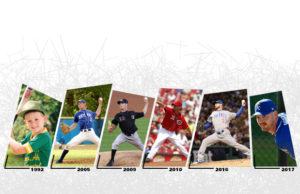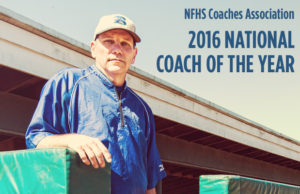ARTistry Appreciation

Baseball, more than any other sport, is engrained into the collective national soul. Major League Baseball was founded in 1869, just a few short years after the end of the Civil War and the assassination of Abraham Lincoln. The game and the people of this country have grown together, and like any other siblings, we have a love-hate relationship.
For one Haskell man, hate has never entered the line-up. Caleb Hardwick is the founder and creator of the website www.arkbaseball.com, better known as the Arkansas Baseball Encyclopedia. Given the depth of knowledge, statistics, stories and extensive research available at the site, it would be a fair assumption that the author must have lived through much of the history presented. Such is not the case. Caleb is 23 years old. He was home schooled and later graduated from the College of the Ouachitas.
His interest in baseball came from his family. His father and grandfather were St. Louis Cardinals fans. Many of his earliest baseball memories are of Mark McGwire setting home run records. He also attended games at Ray Winder Field, cheering on the Arkansas Travelers.
Like most young boys, Caleb played baseball. He describes his career as “rather short lived.” He played one season as a 12-year old Little Leaguer on the Haskell Eagles. “My skill set was not quite adept enough to let me play at the next level. Instead, my brothers and I played our version of one-on-one baseball at home. Some of the most intense sporting events of my life were played between my brothers and me on the vacant lot next door.”
His attention shifted to the perspective of a fan. He listened to Mike Shannon broadcast Cardinal games on KEWI 690 in Benton. He has been to Wrigley Field in Chicago, Minute Maid Park in Houston, Great American Ball Park in Cincinnati and Globe Life Park in Arlington, Texas.
He collected baseball cards. He learned the names of all the teams and players. The stats on the back of the cards taught him how to use Batting Averages and Earned Run Averages.
However, the area that captures the true love of the game for Caleb is what he calls “the aesthetics of baseball.” His words describe it best.
“One of the things that draw me to baseball is the artistry and pure aesthetics of the way it is played. I really believe that baseball players, especially pitchers, have a unique form of kinesthetic brilliance found nowhere else. The details of a pitcher’s windup and delivery are so precise that the slightest change in motion can produce enormously different results. The mental capacity required to throw a 90-mile-per-hour fastball is akin to intellectual genius. A well-performed 4-6-3 double play can be as graceful as a ballet. I don’t think that it’s a stretch to say that the discipline and artistry of many players do, in fact, exhibit the glory of God.”
His interest in baseball history began at age 12 when he came across a photograph of the 1911 Brooklyn Dodgers. He noticed a familiar building in the background as the former Majestic Hotel in Hot Springs. He researched the history of major league spring training in Hot Springs, and he was hooked. He joined a local chapter of the Society for American Baseball Research. One of his first web projects was a site called Arkansas Diamonds, a collection of information and photographs of baseball parks in Arkansas. In 2012, he created the Arkansas Baseball Encyclopedia. The site now has 1,500 pages of information on baseball history in Arkansas, including teams, leagues, players, and ballparks.
Studying baseball has always been a labor of love for Caleb. “I realize that my research will never gain broad public interest. Still, I feel that there is a particular value to knowing our baseball heritage. Because it is essentially the same game that was being played well over a century ago, I can cheer for the Arkansas Travelers baseball games just as my great-great-grandfather could have. I can’t think of any other aspect of American history that connects us so purely with both past and present culture. For that reason, I like to think that my baseball research helps strengthen people’s sense of heritage.”
Through all of the research, statistics, and posts to his website, Caleb says the game of baseball has taught him a broader lesson about life.
“Although baseball has never been something central to my identity, I think I have benefitted a lot from being a fan. Learning team locations taught me geography; statistics taught me math skills; Jackie Robinson and the integration of baseball taught me about social justice, and the broader history of the game has taught me much about American culture. On top of that, I think baseball has helped me connect and relate to older generations of my family and given me a better understanding of what it means to be a part of my community.”









0 comments